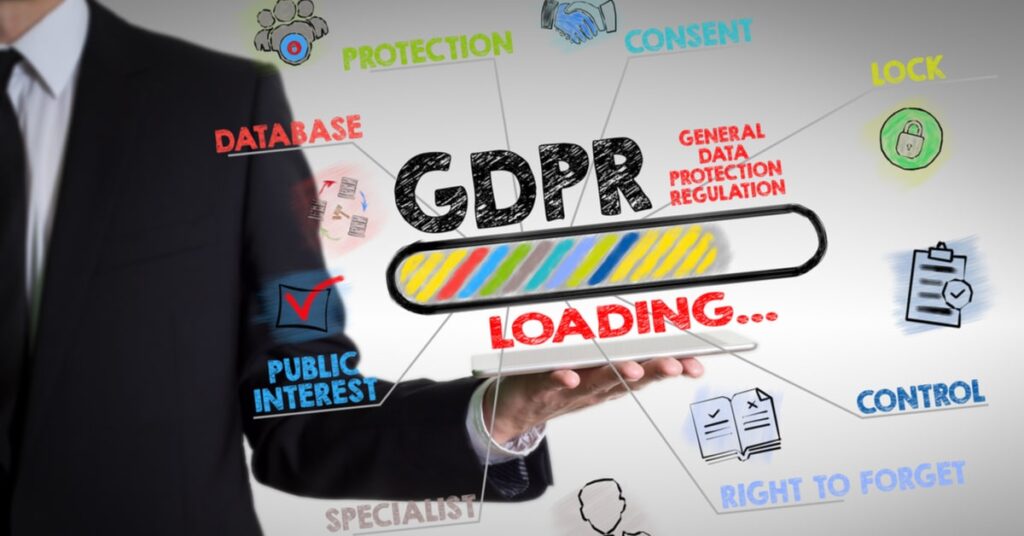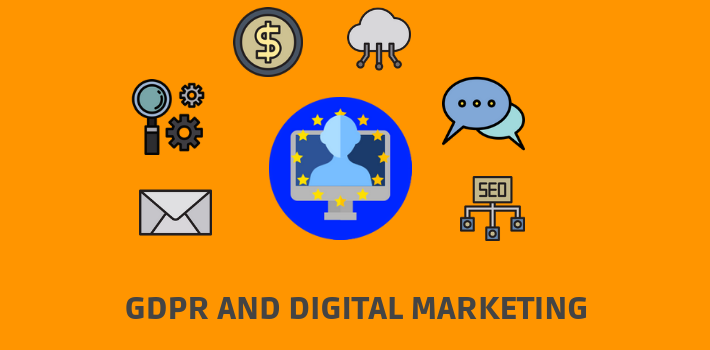Introduction
The General Data Protection Regulation (GDPR) has significantly impacted digital marketing practices since its implementation in May 2018. This regulation, designed to protect EU citizens’ data, has reshaped how businesses collect, process, and store data. In this blog post, we will explore how GDPR affects digital marketing, its challenges, and how businesses can adapt to remain compliant while effectively reaching their audience.
What is GDPR?
The General Data Protection Regulation is a comprehensive data protection law enacted by the European Union. Its primary aim is to give individuals more control over their personal data and simplify the international business regulatory environment by unifying data protection regulations within the EU.

Key Provisions of GDPR
- Data Subject Rights: Individuals have the right to access, rectify, erase, and restrict the processing of their data.
- Consent: Businesses must obtain explicit consent from individuals before collecting or processing their data.
- Data Protection by Design and Default: Organizations must implement data protection measures from the outset of any project involving personal data.
- Breach Notification: Companies must notify authorities and affected individuals of data breaches within 72 hours.
- Accountability and Governance: Organizations are required to document their data protection policies and procedures and ensure compliance.
Impact of GDPR on Digital Marketing
Enhanced Data Privacy and Security
One of the most significant impacts of GDPR on digital marketing is the increased emphasis on data privacy and security. Marketers must ensure that personal data is collected, processed, and stored securely. This has led to the implementation of stricter data protection measures and a shift towards more transparent data handling practices.
Obtaining Explicit Consent
Under the General Data Protection Regulation, businesses must obtain explicit consent from individuals before collecting their data. This affects digital marketing strategies, particularly in areas such as email marketing, where companies must ensure that subscribers have actively opted in to receive communications. Pre-checked boxes and implicit consent are no longer sufficient.
Data Minimization
General Data Protection Regulation encourages the principle of data minimization, meaning that businesses should only collect data that is necessary for a specific purpose. For digital marketers, this means re-evaluating data collection practices and ensuring that only essential information is gathered. This can help build trust with consumers by showing respect for their privacy.
Increased Transparency
Transparency is a core principle of GDPR. Marketers must communicate how they collect, use, and protect personal data. Privacy policies need to be comprehensive and easily accessible, detailing the purposes for which data is processed and the rights of individuals regarding their data.
Impact on Third-Party Data
The use of third-party data for targeted advertising has been significantly impacted by GDPR. Companies must ensure that third-party data providers are GDPR-compliant and that any data used for marketing purposes has been obtained with the necessary consent. This has led to a shift towards first-party data, which is collected directly from customers with their explicit consent.

Challenges of GDPR for Digital Marketers
Compliance Costs
Implementing General Data Protection Regulation compliance measures can be costly, particularly for small businesses. Companies need to invest in data protection infrastructure, legal advice, and ongoing compliance monitoring. However, these costs are necessary to avoid hefty fines for non-compliance.
Adjusting Marketing Strategies
Digital marketers have had to adjust their strategies to align with GDPR requirements. This includes rethinking how data is collected, gaining consent, and managing data storage. Traditional marketing methods, such as email campaigns and retargeting, require careful planning to ensure compliance.
Potential Loss of Data
With the need for explicit consent, businesses may face a reduction in the amount of data they can collect. This can limit the effectiveness of marketing campaigns that rely on detailed consumer data for personalization and targeting. Marketers must find new ways to engage with their audience while respecting their privacy.
Adapting to GDPR in Digital Marketing
Focus on First-Party Data
First-party data, collected directly from consumers with their consent, is becoming increasingly valuable. Marketers should focus on building strong relationships with their audience to encourage data sharing. This can be achieved through loyalty programs, personalized experiences, and transparent communication.
Enhance Data Security Measures
Investing in robust data security measures is crucial for GDPR compliance. Marketers should work closely with their IT departments to implement encryption, access controls, and regular security audits. Ensuring that data is stored securely and that breaches are promptly addressed is essential for maintaining consumer trust.
Implement Clear and Concise Privacy Policies
Transparency is key to gaining consumer trust. Marketers should ensure that privacy policies are clear, concise, and easily accessible. These policies should explain how data is collected, used, and protected, as well as the rights of individuals regarding their data.
Regularly Review and Update Consent Mechanisms
Consent mechanisms should be regularly reviewed and updated to ensure ongoing compliance with GDPR. This includes maintaining records of consent, providing easy opt-out options, and ensuring that consent is freely given, specific, informed, and unambiguous.
Conclusion
GDPR has fundamentally changed the landscape of digital marketing, emphasizing the importance of data privacy, security, and transparency. While compliance presents challenges, it also offers opportunities for businesses to build trust with their audience and improve their data-handling practices. By focusing on first-party data, enhancing security measures, and maintaining clear privacy policies, digital marketers can navigate the complexities of GDPR and continue to thrive in a privacy-conscious world. Share this post if you found it helpful and believe in the importance of data protection in digital marketing!
FAQ
What is GDPR, and why is it important for digital marketing?
GDPR is a comprehensive data protection regulation by the EU, aimed at giving individuals more control over their data. It is important for digital marketing as it enforces strict guidelines on data collection, processing, and storage, ensuring consumer privacy and security.
How does GDPR affect email marketing?
Under GDPR, businesses must obtain explicit consent from individuals before sending marketing emails. This means subscribers must actively opt-in to receive communications, and pre-checked boxes or implicit consent are not sufficient.
What is the principle of data minimization in GDPR?
Data minimization is the principle that businesses should only collect data that is necessary for a specific purpose. For digital marketers, this means gathering only essential information and avoiding the collection of excessive or irrelevant data.
How can businesses ensure GDPR compliance with third-party data providers?
Businesses should ensure that third-party data providers are GDPR-compliant by conducting due diligence, obtaining necessary consent, and documenting data processing activities. This ensures that any data used for marketing purposes has been lawfully obtained.
What are the potential penalties for non-compliance with GDPR?
Non-compliance with GDPR can result in significant penalties, including fines of up to €20 million or 4% of the company’s global annual turnover, whichever is higher. These penalties highlight the importance of adhering to GDPR requirements.